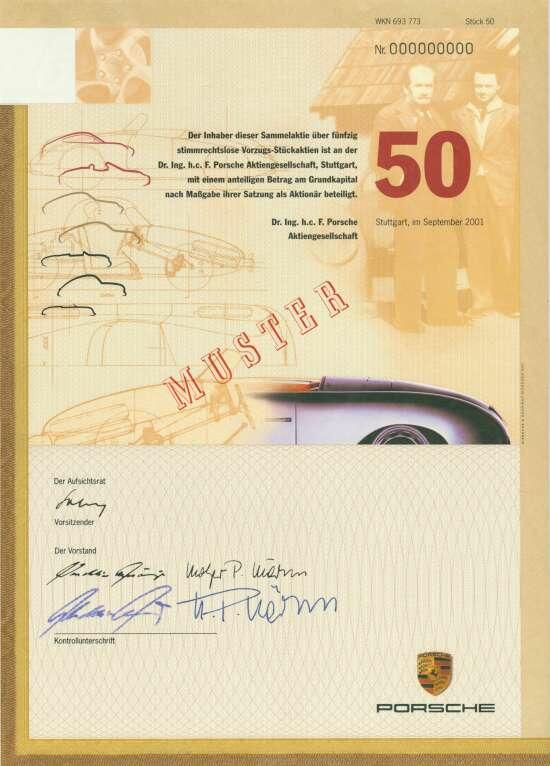Scriposale
A premium of 30% including VAT will be charged.
Lote 614 Stocks and Bonds - Germany
Dr. Ing. h. c. F. Porsche AG [2 Stück], Nominal VZ 1
Stück/50 Stück.
Lot of 2 pieces: a) Stuttgart, September 2001, Specimen of a
Preference No-par Share of 1 Share, #000000000, not cancelled,
coupons, decorative design; b) like a), only 50 Shares. In addition
to the usual facsimile signatures of Prof. Dr. Helmut Sihler (as
Chairman of the Supervisory Board) and Dr. Wendelin Wiedeking and
Holger P. Härter (as Executive Board members), both pieces also
bear the original signatures of Dr. Wendelin Wiedeking and Holger
P. Härter! According to enclosed correspondence from June 2007, it
was planned to also obtain the original signature of Prof. Dr.
Helmut Sihler – however, this did not take place, as he was no
longer a member of the Supervisory Board at that time. Provenance:
Siegfried Wisotzky Collection.
Helmut Sihler (born 1930) is a German business executive and
economist who was considered one of the most influential figures in
German corporate life for several decades. After studying business
administration at the University of Frankfurt and earning his
doctorate in 1958, he began his career at Procter & Gamble, where
he held various international management positions. In 1972, Sihler
joined Henkel KGaA in Düsseldorf, initially as deputy board member
and, from 1980, as CEO. Under his leadership, Henkel evolved into
an internationally operating consumer goods and chemical company.
Sihler focused on sustainable growth, strong brand management, and
global expansion. In 1992, he moved to the company’s supervisory
board. Helmut Sihler also gained particular recognition as Chairman
of the Supervisory Board of Dr. Ing. h.c. F. Porsche AG. In the
1990s and early 2000s, he played a key role in guiding Porsche’s
successful resurgence under CEO Wendelin Wiedeking. Wendelin
Wiedeking (born 1952) is a German mechanical engineer and manager
best known for his long tenure as CEO of Dr. Ing. h.c. F. Porsche
AG. After studying mechanical engineering at RWTH Aachen
University, he began his career at Porsche in 1983. Following a
brief interruption, he returned in 1991 as head of production and
was appointed CEO in 1993 during a time of crisis. Under his
leadership, Porsche was transformed from a company on the brink of
collapse into the most profitable car manufacturer in the world.
Wiedeking streamlined the model range, introduced efficient lean
production methods inspired by the Toyota system, and launched
successful new models such as the Boxster and the Cayenne. His
strategic decisions led to record profits and a rise in Porsche’s
global brand stature. In the 2000s, Wiedeking attempted to take
over the much larger Volkswagen AG - a move unprecedented in German
industrial history. However, the effort ultimately failed, and he
resigned in 2009 as the merger plans were reversed. Wolfgang Heinz
Porsche (born 1943) is an Austrian-German entrepreneur, shareholder
of Porsche SE, and Chairman of the Supervisory Board of both Dr.
Ing. h.c. F. Porsche AG and Porsche Automobil Holding SE (Porsche
SE). He is the youngest son of Ferry Porsche and grandson of
company founder Ferdinand Porsche. After completing an
apprenticeship as a toolmaker at Bosch, he studied business
administration in Vienna and joined Porsche KG in 1976. Initially
working in sales and export, he later moved into executive
leadership roles. Since 2007, he has served as Chairman of the
Supervisory Board of Porsche SE, and since 2010, he has held the
same position at Porsche AG. Wolfgang Porsche played a key role in
restructuring the Porsche Group following the failed takeover of
Volkswagen AG and the subsequent integration of Porsche into the VW
Group. As a representative of the founding Porsche-Piëch family, he
is still considered one of the most influential figures in the
German automotive industry. Holger P. Härter (born 1960) is a
German banker, financial executive, and former board member of Dr.
Ing. h.c. F. Porsche AG. He was a central figure in the company’s
financial strategy in the 2000s—especially in relation to the
ambitious attempt to acquire the much larger Volkswagen AG. Härter
began his career in the banking sector, working for Bayerische
Vereinsbank and Deutsche Bank, among others. He joined Porsche AG
in 1996, where he initially led the finance and controlling
division. In 2001, he was appointed Deputy Chairman of the
Executive Board and CFO. As the architect of the complex financial
structures through which Porsche gradually secured a majority of
VW's ordinary shares, Härter was regarded as an analytical
strategist with major influence over company policy. However, the
high-profile takeover attempt ultimately failed amid the global
financial crisis, and Härter left Porsche in 2010















![Dr. Ing. h. c. F. Porsche AG [2 Stück], Nominal VZ 1 Stück/50 ...](https://cdn.philasearch.com/A09642/S2/614.jpg)


